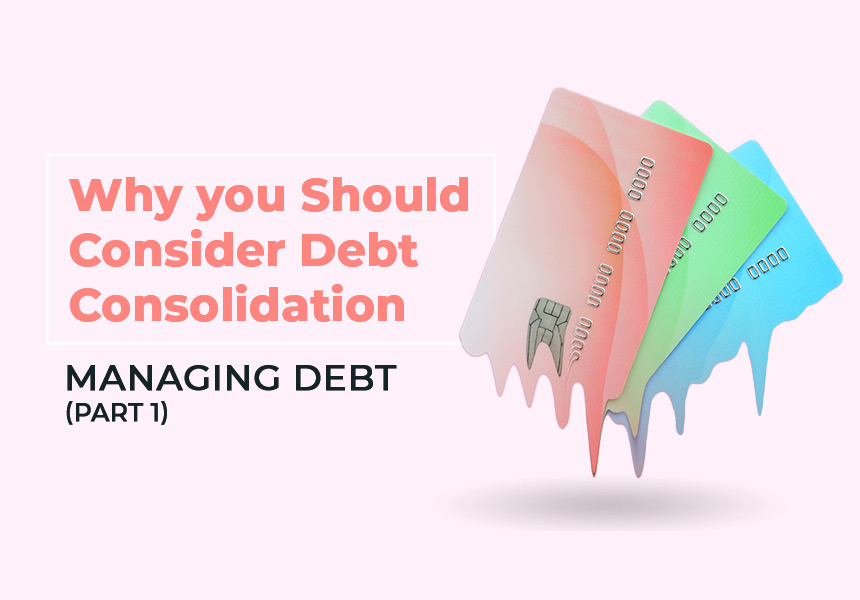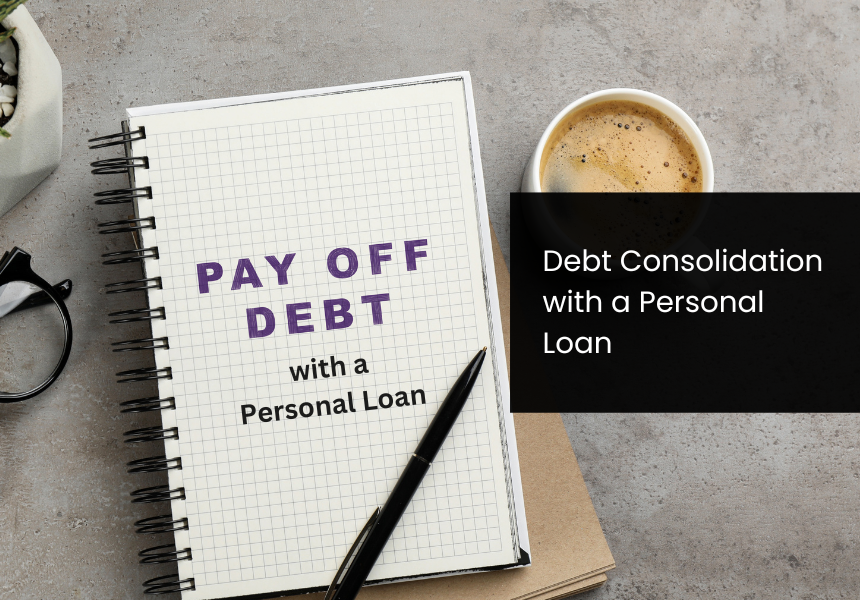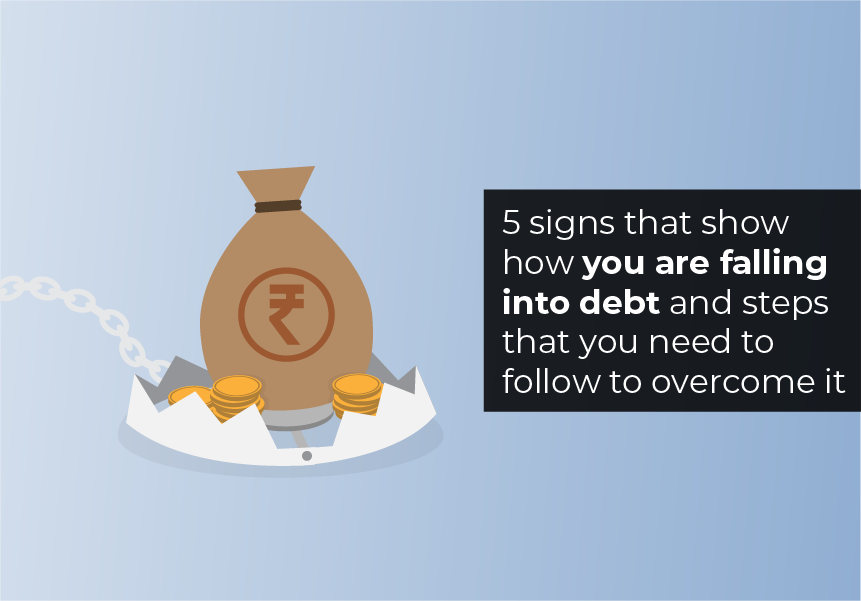
This article is the first part in our series of Managing Debt. Read Part 2 : How to Deal with Credit Card Debt – Managing Debt (Part 2)
What is Debt Consolidation?
Debt consolidation, also called bill consolidation or credit consolidation, is a financial tactic wherein you merge multiple loans, credit card debt, and/or other outstanding payments. You then use a single personal loan to repay this consolidated debt.
Personal loans have a lower interest rate than most credit cards and other credit facilities; so, by applying the debt consolidation method, you will end up paying a lower amount as interest on your debt and can help clear credit card debt.
Another advantage of debt consolidation is that it helps you simplify payments; instead of keeping track of several card or other payment due dates, you only need to pay off one source (personal loan) on the given date.
To help you understand whether you should opt for the debt consolidation or whether you stand to gain by it, we have tried to explain it by providing an example below. The rate mentioned in the example are only for reference purpose. It should not be considered as the standard lending rates.
When does Debt Consolidation work?
While contemplating whether debt consolidation is the best option for you, consider a couple of things to ensure that doing this will lower your monthly payment amount. Let us understand this with the help of an illustration.
Example of Debt Consolidation
Say you own three credit cards. You have an outstanding amount of INR 1,00,000 and it is compounded monthly at an annual rate of 24%. At the end of 6 months, your total amount along with interest would be INR 1,12,616. The same amount would get reduced to INR 1,05,315 if you were to consolidate your credit cards into a loan with reducing balance rate of 18% per annum.
How to consolidate your debts and/or loans?
There are several ways in which you can consolidate your debts.
First option is to consolidate several credit card payments into one new credit card or to a balance-transfer credit card. This is a good option if the new card charges a very low or no interest at all for a certain period.
The second option is to get a personal loan for debt consolidation at a fixed rate or a lower interest rate if compounded and pay off all your outstanding debts in one go. You can then pay off the loan in instalments over a fixed period.
Another option is to opt for home equity loans or home equity lines of credit. It is a loan available against the equity on a property. Some people use this loan amount to clear off their unsecured loans.
Types of Debt Consolidation
Debt consolidation personal loans are offered by financial institutes like banks, credit unions, or other digital lenders. These are classified into two:
-
- Secured loans The borrower needs to provides an asset as collateral for such loans. Mortgage loans, loans against property or car, and loan against gold or life insurance policy are some examples. The main features of secured loans include a low rate of interest, easier availability, and lower risk. For loans taken against property, you may even be able to claim tax deduction.
- Unsecured loans Such loans do not require any asset as collateral. Unsecured loans are ideal for people who do not wish to pledge collateral and are looking for smaller amount of loan. Nowadays, digital lenders are providing unsecured loans with convenience and speed, as well as minimum documentation).

Is Debt Consolidation a good option?
If you have a substantial debt and wish to improve your financial health, debt consolidation can help. A high credit card outstanding bill or other debts can be overwhelming and the inability to make timely payments can take a toll. In such cases, a carefully curated personal loan along with debt consolidation offers a way to jump start timely payments with a lower interest rate and a more streamlined payment schedule.
When is Debt Consolidation not a good option?
Debt consolidation is a one-time savior. So, while it gives you a chance to get your finances back on track after a big spending spree which has put you in considerable debt, it is useful only if you plan to pace and improve your spending habits for good. Using debt consolidation to pay off debt and then being unable to pay the consolidated debt too will only entangle your financial life.
Points to ponder while opting for Debt Consolidation
Pros for of a Debt Consolidation Loan
-
-
- It is a stable and efficient method to get your finances back on track. You can start saving while you are paying off your debt.
- Lower rate of interest and longer tenure for the payoff considerably reduces the monthly outflow amount.
- Allows you to manage a single debt instead of keeping track of multiple payment schedules. Receiving multiple or setting reminders for various payments can sometimes be emotional and overwhelming when you are financially unstable. This system can reduce the stress and time spent on debt management.
- Irregular or late payments on your debts could affect your credit report and score. Regular payments towards single debt consolidation loans help in improving your credit score.
- Debt consolidation will help you save on late payment fees, processing fees and any other penalties that are levied due to late/no payments. The same money can help strengthen your savings and can be used to pay EMIs on your loans, on time.
-
Cons for of a Debt Consolidation Loan
-
-
- Getting a debt consolidation personal loan can be tricky if your credit score / CIBIL score is low. Also, you may get a lower amount as loan than you want, based on your credit rating.
- Taking a secured loan calls for great responsibility because your asset is at stake. Defaulting on payments may make you lose the mortgaged asset.
- Replacing new debts for old ones before the completion of original contract period may sometimes have a negative impact on your credit score.
- Easy and affordable availability of loans will relieve you of your financial burdens. However, if you fall back on this often, you will be in a perpetual cycle of debt.
-
What other financial steps can you take?
Refinancing
Refinancing means replacing an existing debt with a new debt that has more favorable terms in form of lower interest rates or monthly payments. People usually opt for refinancing due to following reasons:
-
-
- A competitor is offering a similar loan at a lower rate of interest. This would reduce your EMI amount.
- If your monthly income has increased and you want to pay off your liability faster, then you can opt for a refinancing with shorter repayment tenure. This will help you get out of debt faster.
- Combining your unsecured and secured debts to take a secured loan with lower rate of interest.
-
Balance Transfer
It is a process of transferring debts from credit cards that charge high rate of interest to another card with lower interest rates. In this process you are merely transferring your debts and not repaying it. A balance transfer fee will be charged during this process. To be eligible for a zero-balance transfer card you require a good credit score. Also, the credit card for balance transfer should have enough credit limit for paying off your debts. The limit should not be maxed out after the transaction. For such cards it would be beneficial to repay the said amount within the time when interest rates are zero or minimum.
What is the difference between Debt Consolidation and Refinancing?
While debt consolidation aims at combining multiple debts into a single debt, refinancing aims at optimizing the present debt or loan by replacing it with another loan or debt that has higher benefits, such as lower rate of interest.
If you have too many debts to keep up with like outstanding credit card bills, home loans, or car loans it would probably be best if you opt for debt consolidation. But consider a scenario where you have purchased a house recently and you still have more than 20 years to pay off your loan. Your home loan is at 9%, and presently, the home loans are available at 8.5%. Then, it is advisable to go for refinancing as the difference of 0.5% interest rate would bring considerable change in your EMI. Even a slight change in the interest rate would save a lot of money in the long run. Therefore, depending on your situation, you should decide whether to opt for debt consolidation or refinancing.
How to Consolidate your Debts?
As mentioned earlier that there are various instruments such as personal loans or credit card takeover loans, credit card balance transfers, or home equity loans that can be used for debt consolidation. You can avail personal loans or credit card takeover loans easily from any banks or financial institutes. These loans are disbursed after verifying the applicant’s credit score, income, employment records, and repayment history. Personal loan amount varies from vendor to vendor. It ranges anywhere between INR 10,000 to INR 40,00,000 depending on your eligibility. The rate of interest varies between 10.50% to 22% depending on the lender.
At LoanTap, we provide credit card takeover loans which is a loan for credit card payment. This loan for repaying credit card which is at competitive rates and the application process is easy and simple. The process is totally transparent with no hidden charges. We offer loans ranging from INR 50,000 up to INR 2,00,000 based on your eligibility. The tenure for credit card take over loan is 12 months. You will require to pay interest amount every month and principal amount in lump sum at the end of loan tenure. There are no foreclosure charges for pre-payment after six months of regular repayment toward the loan. Nominal charges are applicable if you wish to foreclose within six months of disbursal.
Consolidation may be a light at the end of the tunnel for people with debt problems. But it is not a solution for anyone’s financial woes. It is important to improve your spending habits. Timely payments will help in managing your financial goals and improving your credit scores.
Read Part 2 of our series on Managing Debt: How to Deal with Credit Card Debt – Managing Debt (Part 2)







